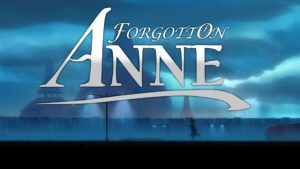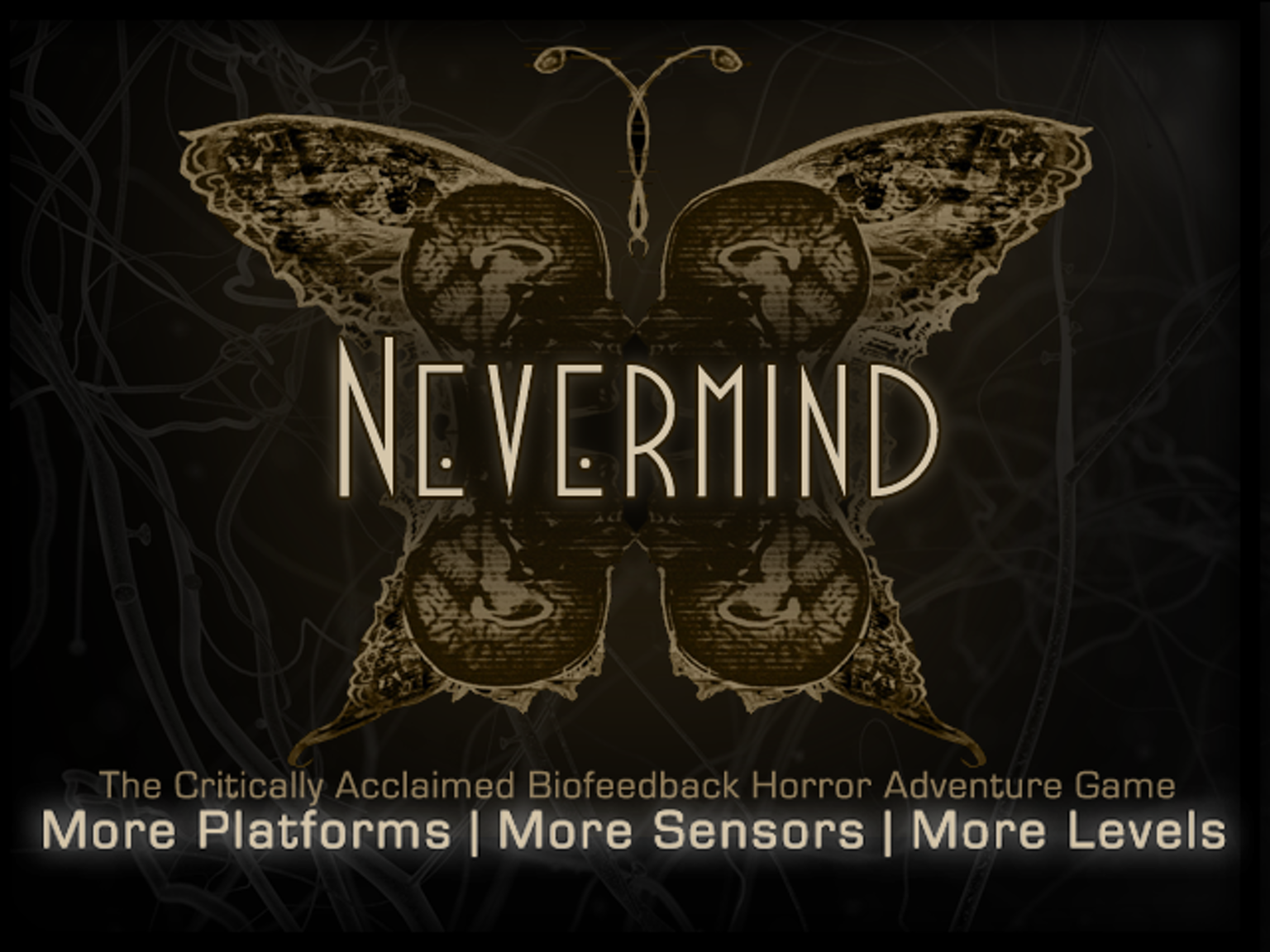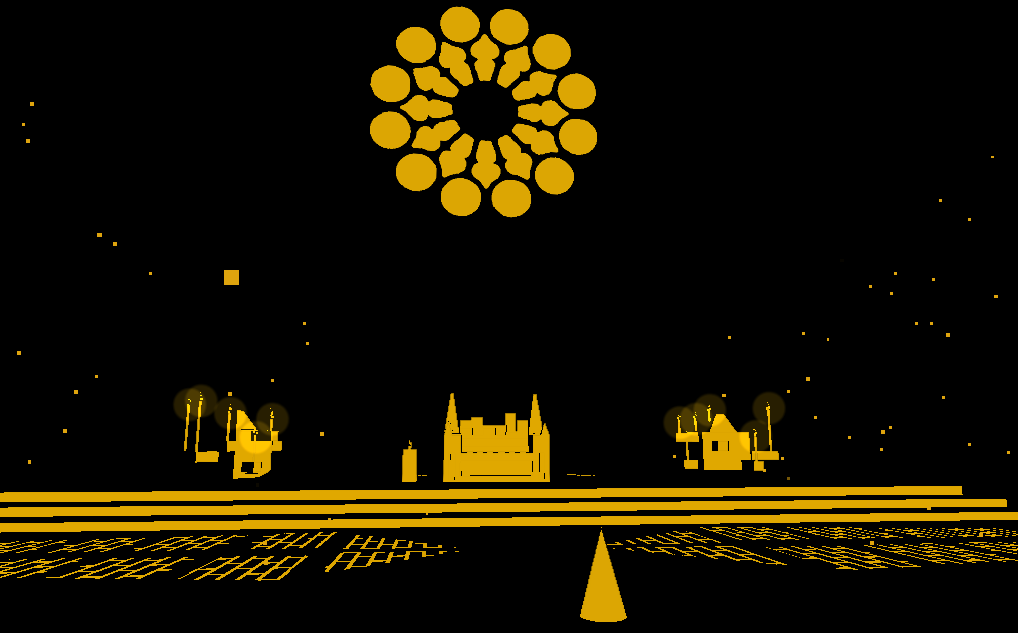Like many people, when I first started playing Forgotten Anne it felt like I was playing inside of a Studio Ghibli film. The game is a cinematic adventure platformer that contains beautifully illustrated graphics, amazing and adaptive choregraphed music and seamless animations. At many times it looks and feels like you are playing a movie. Also much like a Studio Ghibli film, the game contains an abundance of allegories, metaphors, and themes, both overt and subtle. These commentaries are socially, politically, and environmentally charged and extremely relevant. Though I still have the final chapter to play, this game has thus far proven to be a stellar example of how a game can help deepen understanding and generate sympathy for those that are different from us, those we do not understand as well as we think we do, and those that suffer the most under repressive circumstances.
The game follows a woman named Anne. She is the Enforcer in a world where objects have gone once they are forgotten. Other than Bonku, an elderly man many call Master or the Creator, she is the only human. Her job as the Enforcer is to keep forgotten objects, known as Forgotlings whom are now animate beings, under control. She does this through the power of the Arca, a device attached to her hand that allows her to control the energy source, known as Anima, within the realm. Harnessing this power Anne can actually “distill” Forgotlings souls. Basically, she absorbs the Anima (their life force) and kills them.
The game starts during a troubled period in which Forgotlings are divided. Rebels have started to bomb factories that work on a project known as the Ether Bridge. Once completed the Ether is supposed to transport Forgotlings back to the real world. The other Forgotlings are very much dedicated to Bonku’s vision, some to the point of complete devotion.
The rebels are upset with the current order of their world – when a Forgotling first enters the realm they are herded through a checkpoint in which their future is decided for them – do they work at the factory or do they get a job outside doing typical jobs that we think of – construction worker, manager, police officer, actor, bartender ect… The intro cinematic makes it very clear that if you are a unique item or an item that is well preserved despite being forgotten, you are preferred over the others. More “mundane” items, like a single sock, are sent to factory. Forgotlings that have been distributed are then “verified” and are given a green sticker that they then must wear on their person the entire time. Forgotlings (even verified ones, but especially ones that work at the factory) are treated like second class citizens and getting to cross the Ether bridge is a privilege granted only by Bonku himself based on how hard each individual works.
At the beginning of the game Anne wakes up to one of the explosions set off by the rebels. An escaped rebel enters her home and she must decide what to do with him. Regardless of the players choice her journey to catch the rebels, and to a deeper understanding, has now begun.
Before I explain the commentaries within the game in more detail (though you can probably tell where some of the are going) I think I should describe the intro cinematic. The first time I saw this cinematic I was initially struck by all the subtle commentaries within the sequence. At first glance is just seems like a collective of artistic shots showing a bustling and busy city, much like New York. I kept thinking of each shot and the more I thought of them, the more I believed each segment to mean something more than just and introduction to this story.
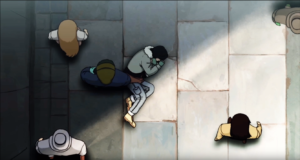 At one point people are quickly walking about and over a homeless person sleeping on the sidewalk, demonstrating extreme poverty and the vast differences in class. Skip to another part and people are quickly throwing trash into a trash can that is quickly growing and already flooded displaying the extreme waste and harm to the environment. Another shot shows people strolling through a high tech store after looking at their smart phones and watches illustrating a degree of materialism and societal focus on time and the individual. One of the final shots of the real world shows a man getting up with a small collection of pills next to his alarm clock, demonstrating a certain degree of addiction and dependence.
At one point people are quickly walking about and over a homeless person sleeping on the sidewalk, demonstrating extreme poverty and the vast differences in class. Skip to another part and people are quickly throwing trash into a trash can that is quickly growing and already flooded displaying the extreme waste and harm to the environment. Another shot shows people strolling through a high tech store after looking at their smart phones and watches illustrating a degree of materialism and societal focus on time and the individual. One of the final shots of the real world shows a man getting up with a small collection of pills next to his alarm clock, demonstrating a certain degree of addiction and dependence.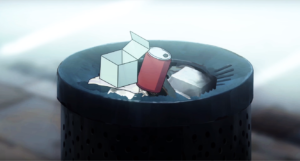
At one point I thought I was overthinking it – maybe the pills were for a headache and it the modern era with the extreme advance in technology, it is not uncommon to see people strolling through high tech stores. Though as I continued to play each of those themes was steadily presented throughout the duration of the game. This is done through an interesting parallelism and yet ironic contrast that the developers have created between the Forgotling world and the real world. The setting, the events Anne witnesses or experiences, and individual Forgotlings themselves embody the aforementioned issues that afflict society, yet are presented in a contrasting light.
The overall setting of the Forgotling world is immersed in a steampunk industrial backdrop where it always rains. When looking in to the distance you can see a perpetual fog and smoke from the factories that create Anima, which, as the game reveals later is basically a nonrenewable source. 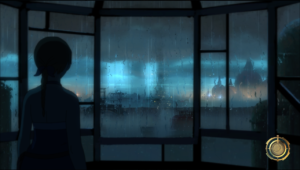
To drive home the undertone of humans impact on the environment, Anne is literally drowning in a pile of growing trash at one point. During this scene an omniscient voice tells her how wasteful humans are. She explains that they take more then they need only to throw things away or forget them.
One character that reflects these habits is a treasure chest Anne comes across during her travels. Inside his home you can see all kinds of trinkets he has hoarded. He has found a purpose in life by collecting items due to an extreme curiosity to know all things about the world. However, the chest also presents and interesting contrast to the way the humans are depicted within the game. Though somewhat materialistic the chest does not truly care whether or not he owns the objects he seeks as long as he can see them and learn about them. He is driven by a degree of purity and innocence to understand the world in order to appreciate it.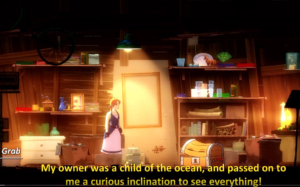
Poverty and addiction are also present in the Forgotlings world. During her time trekking across the city Anne meets some drunk and stoned Forgotlings, and it becomes clear this is not a one time occurrence for them. Continuing upon this theme, when Anne enters a bar to search for the rebel leader the player can easily see it is the most populated environment in the game. When talking to the bartender he explains to Anne that many come to his bar not remember, but to do what “Forgotlings to best” – forget. However, in another ironic contrast, the patrons do more than just drink. It is a vibrant bar with many events happening at once – some are happily watching a movie in a theater, others are playing cards games with their friends, and others are merely sitting with each other and comfortably chatting.
They are happily biding their time and many are still eagerly finding a purpose since arriving (and yes for some that is an unfortunate toxic devotion to those that are repressing them). Unlike what one expects of a bustling city, especially where time is limited for Forgotlings as they crystallize when they get older, the Forgotlings are happy to make the most of their time. None of them seem particularly worried about crystallizing and they move about each day doing their duties without much rush (apart from most factory workers).
One theme that I hinted at earlier is that Forgotlings are quite literally treated like objects within the game. At certain points whenever a character gets mad, whether that be Anne, Bonku, or another Forgotling, arguments quickly delve into a hateful territory. Arguments turn into shouting matches where insults are thrown about their “only and proper uses”. Furthermore, they are pushed and threatened daily into working for a “higher power” in extremely unhealthy conditions. Many Forgotlings work vigorously and in overtime, many just because they are afraid of the consequences. When they make a mistake, their fear is all the more apparent.
Part of this is due to the nature of Anne and Bonku’s power and their hold over half of the population – harnessing individuals clear devotion. Much of this is contributed by the extreme “Big Brother is watching” vibe throughout the game and the intense insertion of propaganda into the Forgotlings’ everyday lives.
Mirrors are setup throughout the cities. These mirrors can be accessed by Bonku and he can watch the Forgotlings’ every move. Both Bonku, Anne, and Forgotlings who favor the Creator argue that it is for their protection and is the best option. Furthermore, the Forgotlings can only listen to one radio station and watch one channel on the tv, both of which promote Bonku’s agenda and shower Anne in praise.
As aforementioned, Forgotlings, despite Anne’s initial beliefs, are not well treated. Her lack of understanding is highlighted in the middle of the game during a train sequence when she goes from car to car asking Forgotlings their business and to see their validation stickers. She states that she just wants to make sure all of them “feel safe” aboard after the rebel attack. Some thank her, some ignore her and are annoyed by the invasion of privacy, and some are very, very scared of her.
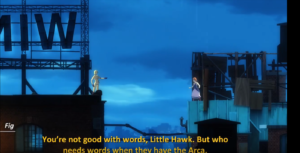 Why? Because the only real threat to them other than ageing with time is Anne herself. Therefore, Anne is very much an ignorant person wielding a great deal of power. When people point out the irony of her situation – that she is supposed to be their protector yet many do not see it or feel that way as they are often verbally and physically threatened by her, she gets mad. She clings to this ignorance throughout the game continually stating Forgotlings do not understand what they are doing, what is at stake, and she truly believes it is every Forgotlings wish to “go home”, as she does not remember their inanimate nature in the real world.
Why? Because the only real threat to them other than ageing with time is Anne herself. Therefore, Anne is very much an ignorant person wielding a great deal of power. When people point out the irony of her situation – that she is supposed to be their protector yet many do not see it or feel that way as they are often verbally and physically threatened by her, she gets mad. She clings to this ignorance throughout the game continually stating Forgotlings do not understand what they are doing, what is at stake, and she truly believes it is every Forgotlings wish to “go home”, as she does not remember their inanimate nature in the real world.
As players continue to play, they soon realize Anne is not completely to blame (though I think the effect is greatest if the player has chosen a pacifist playthrough). As the game illustrates these harsh realities, the players gain a better understanding of the Forgotlings’ lives and garner a deeper sympathy towards these characters. They also start to reveal the own struggles Anne has had and now has to face.
Forgotten Anne provides a stunning example of how games can embody and illustrate social, political, and environmental issues. This experience also clearly demonstrates how games can better generate empathy and understanding. Some may think it is heavy handed, but I urge players to understand many of these issues in life are indeed very heavy and daily for those who are affected. As the game best illustrates, just because you many not experience or see it does not mean that it is not harmful for others. Furthermore, I urge these players to look at the more subtle instances of these themes and how these play into broader narratives.

